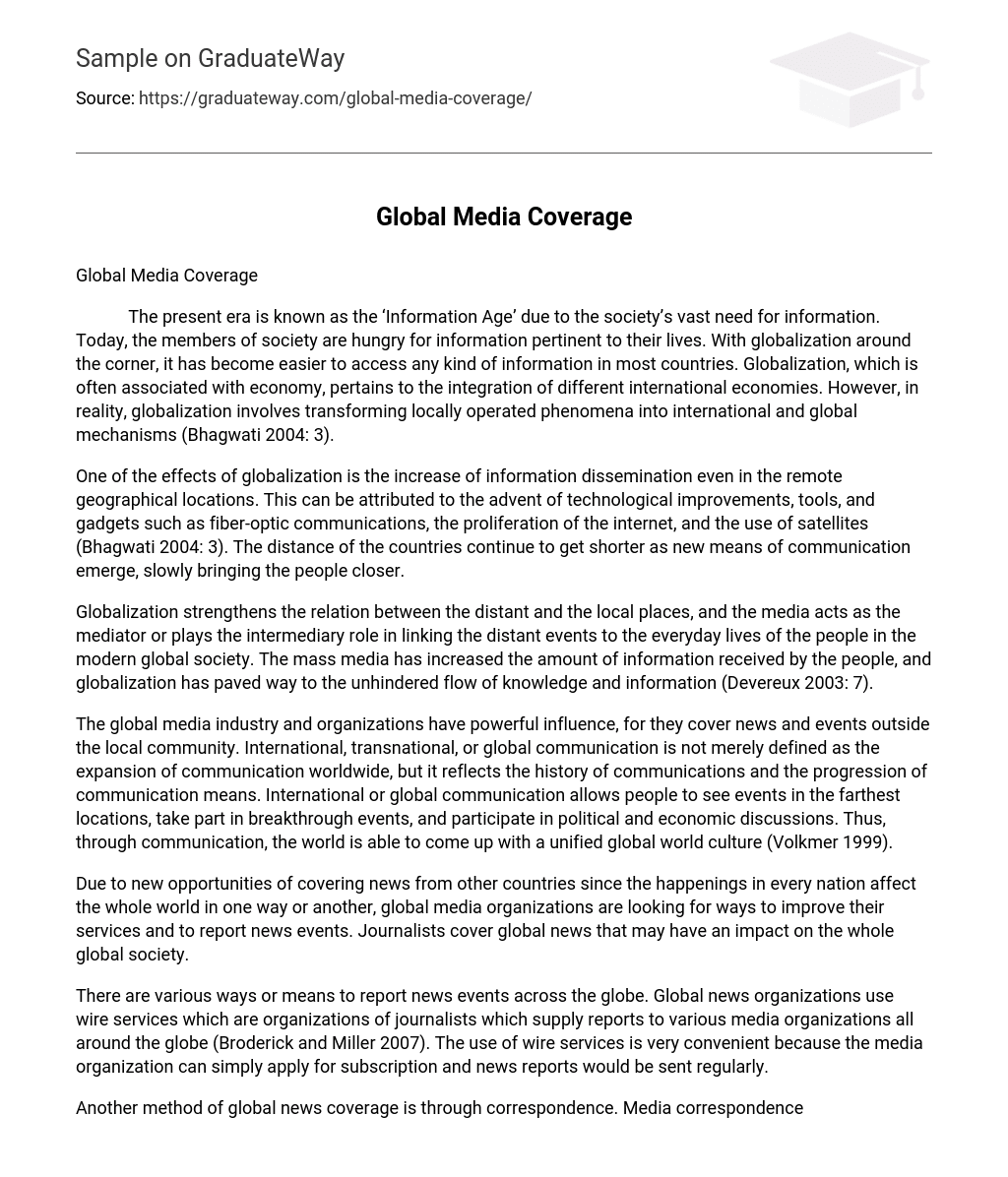The present era is known as the ‘Information Age’ due to the society’s vast need for information. Today, the members of society are hungry for information pertinent to their lives. With globalization around the corner, it has become easier to access any kind of information in most countries. Globalization, which is often associated with economy, pertains to the integration of different international economies. However, in reality, globalization involves transforming locally operated phenomena into international and global mechanisms (Bhagwati 2004: 3).
One of the effects of globalization is the increase of information dissemination even in the remote geographical locations. This can be attributed to the advent of technological improvements, tools, and gadgets such as fiber-optic communications, the proliferation of the internet, and the use of satellites (Bhagwati 2004: 3). The distance of the countries continue to get shorter as new means of communication emerge, slowly bringing the people closer.
Globalization strengthens the relation between the distant and the local places, and the media acts as the mediator or plays the intermediary role in linking the distant events to the everyday lives of the people in the modern global society. The mass media has increased the amount of information received by the people, and globalization has paved way to the unhindered flow of knowledge and information (Devereux 2003: 7).
The global media industry and organizations have powerful influence, for they cover news and events outside the local community. International, transnational, or global communication is not merely defined as the expansion of communication worldwide, but it reflects the history of communications and the progression of communication means. International or global communication allows people to see events in the farthest locations, take part in breakthrough events, and participate in political and economic discussions. Thus, through communication, the world is able to come up with a unified global world culture (Volkmer 1999).
Due to new opportunities of covering news from other countries since the happenings in every nation affect the whole world in one way or another, global media organizations are looking for ways to improve their services and to report news events. Journalists cover global news that may have an impact on the whole global society.
There are various ways or means to report news events across the globe. Global news organizations use wire services which are organizations of journalists which supply reports to various media organizations all around the globe (Broderick and Miller 2007). The use of wire services is very convenient because the media organization can simply apply for subscription and news reports would be sent regularly.
Another method of global news coverage is through correspondence. Media correspondence pertains to affiliated journalists sent to another country to cover the relevant events taking place in that country. The correspondent is assigned to a certain beat and covers the various news events that are important to the local setting. The journalists that cover the news and reveal the truth about the happenings within another country are prone to accidents. Sometimes, they even risk their own lives. For example, correspondents who are assigned to cover war in a country or a nation that has an unstable security have to face risks in order to capture the events of the war.
Globalization has also altered the process of news reportage. Many media organizations are going global and cover news in different nations. Due to globalization, the events that transpire in one country influence other countries in one way or another. As a result, the demand for global news has increased. However, the information should be fair and just, and it should not pertain to or lean towards a particular race since the global media organizations cater to audiences coming from various cultural backgrounds. Hence, journalists should not favor a particular culture, race, and ethnic group. Instead, they should solicit the views and opinions of both parties involved in an issue.
List of References
- Bhagwati, J. (2004) In Defense of Globalization. Oxford, New York: Oxford University Press.
- Broderick, J. & Miller, D. (2007) Consider the Source: a Critical Guide to 100 Prominent News and Information Sites on the Web. Medford, N.J.: CyberAge Books/Information Today.
- Devereux, E. (2003) Understanding the Media. London: Sage Publications Ltd.
- Volkmer, I. (1999) ‘International Communication Theory in Transition: Parameters of the New Global Public Sphere’. MIT Communications Forum (19 December 1999) [online] available from <http://web.mit.edu/comm-forum/papers/volkmer.html>





